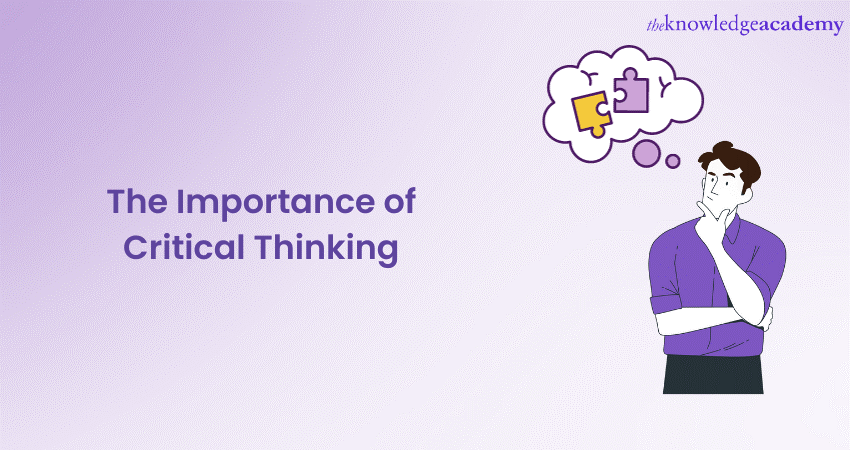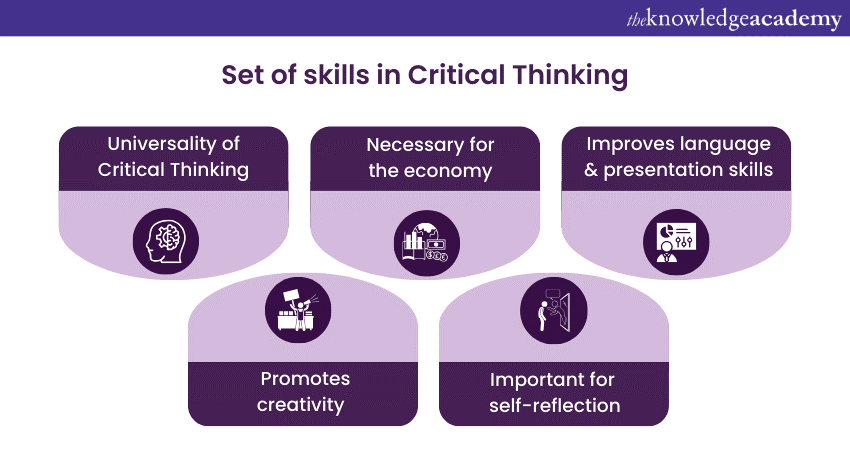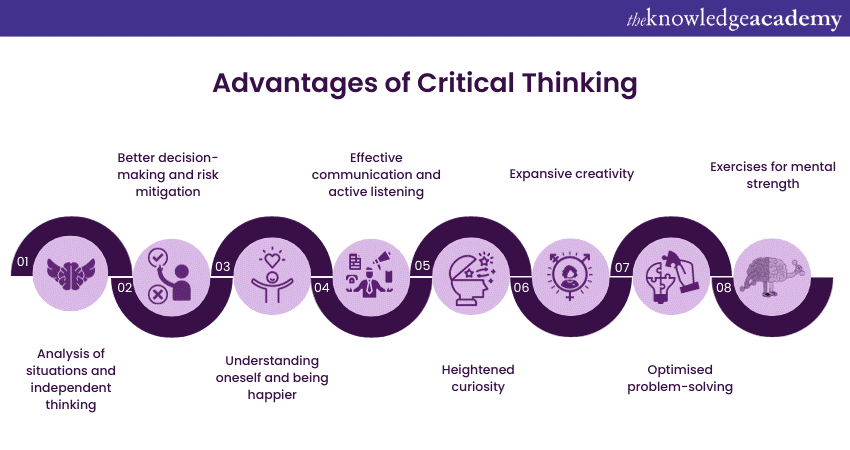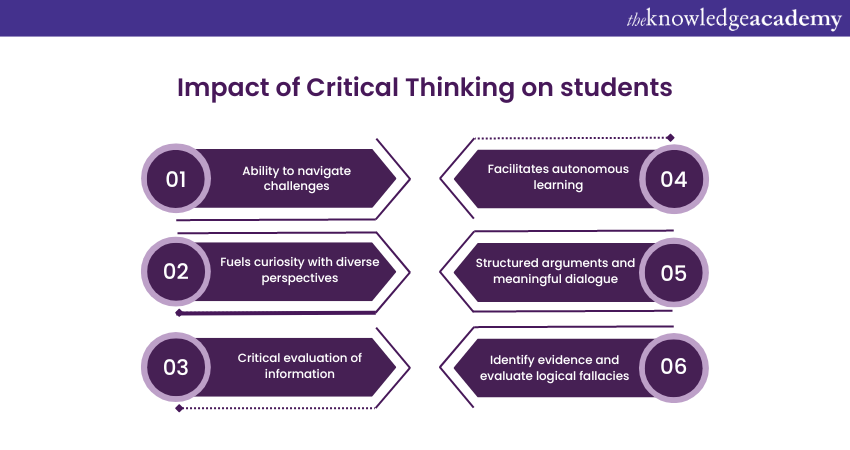We may not have the course you’re looking for. If you enquire or give us a call on +852 2592 5349 and speak to our training experts, we may still be able to help with your training requirements.
Training Outcomes Within Your Budget!
We ensure quality, budget-alignment, and timely delivery by our expert instructors.

The Importance of Critical Thinking stands as a beacon for intellectual resilience and growth. As we navigate a landscape inundated with information and diverse perspectives, the ability to think critically becomes a vital tool.
Moreover, this introductory skill is not merely academic; it shapes your career, refines your decision-making, and fosters a culture of innovation. In this blog, you will learn how Critical Thinking is immensely important in various aspects of life due to its multiple uses, followed by the impact it has on students.
Table of Contents
1) Understanding what Critical Thinking is
2) Highlighting the importance of Critical Thinking
3) Exploring the advantages of Critical Thinking
4) The positive impact of Critical Thinking on students
5) Conclusion
Understanding what Critical Thinking is
Critical Thinking is a cognitive process characterised by the ability to analyse, synthesise, and evaluate information and arguments. It goes beyond simply accepting or memorising facts; it involves actively questioning, interpreting, and reasoning to form well-informed judgments.
At its core, Critical Thinking encourages individuals to approach Problem-Solving in a systematic manner, considering multiple perspectives and potential solutions. Key components of Critical Thinking include logical reasoning, evidence-based decision-making, and the willingness to challenge assumptions.
Furthermore, it requires a disciplined and reflective mindset, enabling individuals to sift through information, identify biases, and recognise logical fallacies. Critical thinkers are adept at connecting disparate pieces of information, discerning patterns, and drawing sound conclusions.
In educational and professional settings, Critical Thinking is highly valued. It empowers individuals to solve complex problems, make informed decisions, and adapt to rapidly changing circumstances. In the workplace, employees with strong Critical Thinking skills are better equipped to navigate challenges, contribute innovative ideas, and communicate effectively with colleagues.
Highlighting the importance of Critical Thinking
The importance of Critical Thinking pivots on the following set of skills:

Universality of Critical Thinking
Critical Thinking is a universal skill applicable across various disciplines and contexts. It transcends cultural and societal boundaries, providing individuals with a framework to approach problems and make decisions regardless of their background. Its universality lies in the ability to analyse information, question assumptions, and engage in reasoned discourse, making it an essential tool for individuals in diverse fields and walks of life.
Necessary for the economy
Critical Thinking is fundamental for driving innovation and problem-solving. Businesses benefit from employees who can critically evaluate situations, identify opportunities, and make informed decisions. Critical Thinking fosters adaptability, enabling professionals to navigate complex challenges and contribute to the growth and resilience of the economy.
Improves language & presentation skills
Critical Thinking is closely intertwined with Effective Communication. Individuals adept at Critical Thinking tend to express themselves more clearly and persuasively. They can structure arguments logically, support their ideas with evidence, and engage in meaningful dialogue. These enhanced language and presentation skills are valuable not only in professional settings but also in personal interactions, fostering better understanding and collaboration.
Promotes creativity
Critical Thinking and creativity are symbiotic. Critical thinkers explore unconventional ideas, challenge the status quo, and embrace innovation. By encouraging divergent thinking, Critical Thinking promotes creative problem-solving. The ability to connect disparate concepts and envision novel solutions is a hallmark of critical thinkers, contributing significantly to advancements in science, technology, and the arts.
Important for self-reflection
Critical Thinking involves introspection and self-awareness. Individuals who engage in Critical Thinking regularly are more likely to reflect on their beliefs, values, and decision-making processes.
This self-reflection enhances personal growth, enabling individuals to refine their perspectives, overcome biases, and continually improve their cognitive abilities. The introspective aspect of Critical Thinking fosters a mindset of continuous learning and adaptability.
Exploring the advantages of Critical Thinking
Below is a list highlighting the several advantages of Critical Thinking:

Vital for career success
Critical Thinking is indispensable for career success, serving as the cornerstone of effective problem-solving, strategic decision-making, and innovative contributions. In the professional landscape, employers highly value individuals who can analyse situations, think independently, and approach challenges with a discerning mindset.
Improved decision making
Improved decision-making, rooted in Critical Thinking, is a transformative skill. It empowers individuals to assess situations, weigh alternatives, and make well-informed choices. Critical thinkers excel in anticipating consequences, mitigating risks, and embracing opportunities.
Individuals are happier
Engaging in Critical Thinking often leads to a profound understanding of oneself and the world, contributing to heightened levels of happiness. Those who actively cultivate Critical Thinking skills tend to navigate life's challenges with resilience, finding purpose and satisfaction in their pursuits.
Ability to form well-informed opinions
The ability to form well-informed opinions through Critical Thinking is a transformative skill. Critical thinkers base their perspectives on evidence, thoughtful analysis, and a discerning evaluation of information.
Enhanced citizens
Enhanced citizens, shaped by Critical Thinking, form the bedrock of a thriving society. Individuals skilled in Critical Thinking actively participate in civic life, contributing to informed public discourse and effective decision-making.
Improves interpersonal relationships
Critical Thinking enhances interpersonal relationships by fostering effective communication and understanding. Individuals who are adept at Critical Thinking are skilled listeners who can empathise with and appreciate diverse perspectives.
Promotes curiosity
Critical Thinking serves as a catalyst for curiosity, inspiring individuals to explore and question the world around them. It cultivates a mindset of continuous inquiry, encouraging people to seek understanding, challenge assumptions, and delve into new ideas. Critical thinkers are naturally curious, driven to explore diverse perspectives and uncover knowledge.
More space for creativity
Critical Thinking creates expansive space for creativity, allowing individuals to approach challenges with innovative perspectives. By questioning assumptions and embracing diverse viewpoints, critical thinkers break through conventional barriers, unlocking the door to imaginative solutions.
Enhances problem-solving skills
Critical Thinking is synonymous with effective problem-solving. Individuals skilled in Critical Thinking can approach challenges methodically, break down complex issues, and develop strategic solutions.
Opportunity to exercise the mind
Regular engagement in Critical Thinking exercises the mind, keeping cognitive faculties sharp and promoting mental agility. This continuous mental exercise contributes to overall cognitive health and longevity.
Creates independence
Critical Thinking cultivates independence of thought. Individuals who can think critically are less likely to be swayed by misinformation or undue influence. This independence fosters autonomy and resilience in navigating life's challenges.
Crucial life skill
Above all, Critical Thinking is a crucial life skill. It equips individuals with the tools needed to navigate the complexities of life, make informed choices, and continually adapt to an ever-changing world.
The positive impact of Critical Thinking on students
Critical Thinking has a multi-faceted impact on students, positively affecting both their personal and academic endeavours, such as:

Key to career success
Critical Thinking is the linchpin for career success, equipping individuals to navigate challenges, make informed decisions, and contribute innovatively. Employers value this skill as it fosters adaptability, strategic thinking, and problem-solving acumen, enhancing professional growth and advancement.
Enhances creativity & curiosity
Critical Thinking fuels creativity and curiosity by encouraging individuals to explore diverse perspectives, challenge assumptions, and think innovatively. This synergy between Critical Thinking and creativity results in the generation of original ideas, fostering a continuous cycle of intellectual exploration and imaginative problem-solving.
Enhances research skills
Critical Thinking enhances research skills by guiding individuals to critically evaluate information, discern biases, and synthesise findings. This systematic approach to information processing strengthens the quality and depth of research, ensuring a more robust and insightful exploration of various topics.
Elevates autonomous learning
Critical Thinking elevates autonomous learning, empowering individuals to independently acquire knowledge, analyse information, and engage in self-directed inquiry. This self-driven approach to learning cultivates intellectual independence, fostering a lifelong commitment to acquiring new skills and staying informed in a rapidly changing world.
Be a good communicator
Critical Thinking is foundational to effective communication. It enables individuals to articulate ideas clearly, structure arguments logically, and engage in meaningful dialogue. This proficiency in communication is invaluable in personal and professional contexts, fostering mutual understanding and collaboration.
Solve problems
Critical Thinking is instrumental in problem-solving, guiding individuals to analyse situations, consider multiple perspectives, and devise effective solutions. It promotes a methodical approach to addressing challenges, enhancing one's ability to navigate complex problems and contribute to successful outcomes.
Make sense of information
Critical Thinking helps individuals make sense of information by teaching them to evaluate, interpret, and synthesise data. This skill is crucial in a world inundated with information, allowing individuals to discern relevant details and form well-informed opinions.
Make decisions
Critical Thinking is fundamental to decision-making, empowering individuals to weigh options, anticipate consequences, and choose the most effective course of action. This skill ensures thoughtful and strategic decision-making in both professional and personal domains.
Helps in analysing arguments
Critical Thinking aids in analysing arguments by teaching individuals to evaluate evidence, identify logical fallacies, and assess the validity of claims. This skill enhances the ability to engage in reasoned discourse and make sound judgments based on evidence and thoughtful analysis.
Make students ask the right questions
Critical Thinking encourages students to ask the right questions, fostering a mindset of inquiry and exploration. By challenging assumptions and seeking deeper understanding, students develop the ability to pose thoughtful and probing questions, enriching the learning experience and promoting intellectual curiosity.
Students learn to think out-of-the-box
Critical Thinking encourages students to think out-of-the-box, fostering a creative and innovative mindset. By embracing diverse perspectives and challenging conventional thinking, students develop the ability to approach problems with originality, contributing to a culture of creative problem-solving and exploration.
Conclusion
In conclusion, the Importance of Critical Thinking cannot be overstated. It is the linchpin for success in various aspects of life, from career advancement and problem-solving to fostering creativity and curiosity. Embracing this skill enriches our understanding, shapes our decisions, and propels us towards a more informed and resilient future.
Troubleshoot issues and solve them effectively, by signing up for our Problem-Solving Training now!
Frequently Asked Questions
Upcoming Business Skills Resources Batches & Dates
Date
 Problem Solving Course
Problem Solving Course
Fri 24th Jan 2025
Fri 21st Mar 2025
Fri 2nd May 2025
Fri 27th Jun 2025
Fri 29th Aug 2025
Fri 3rd Oct 2025
Fri 5th Dec 2025







 Top Rated Course
Top Rated Course



 If you wish to make any changes to your course, please
If you wish to make any changes to your course, please


